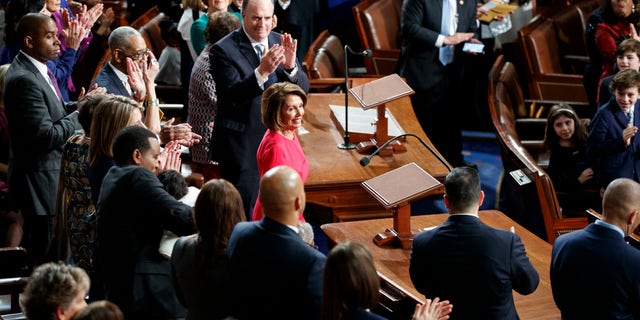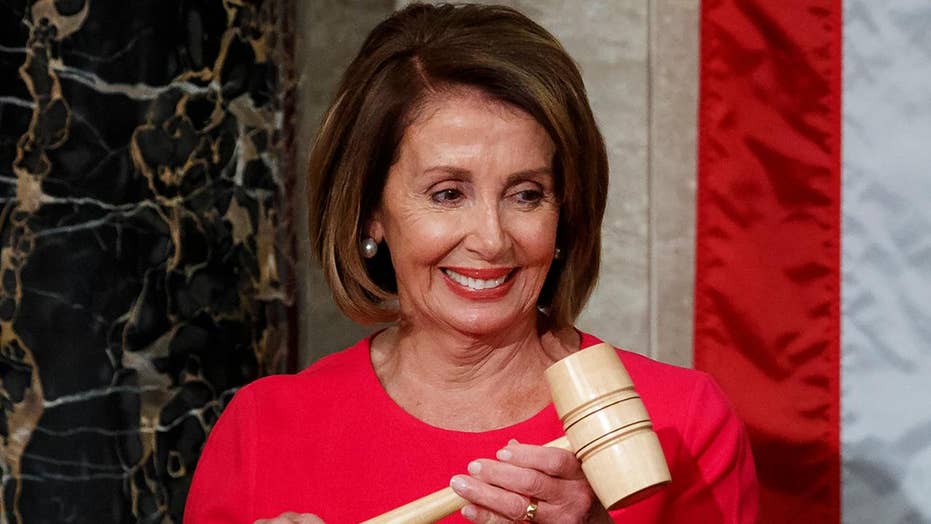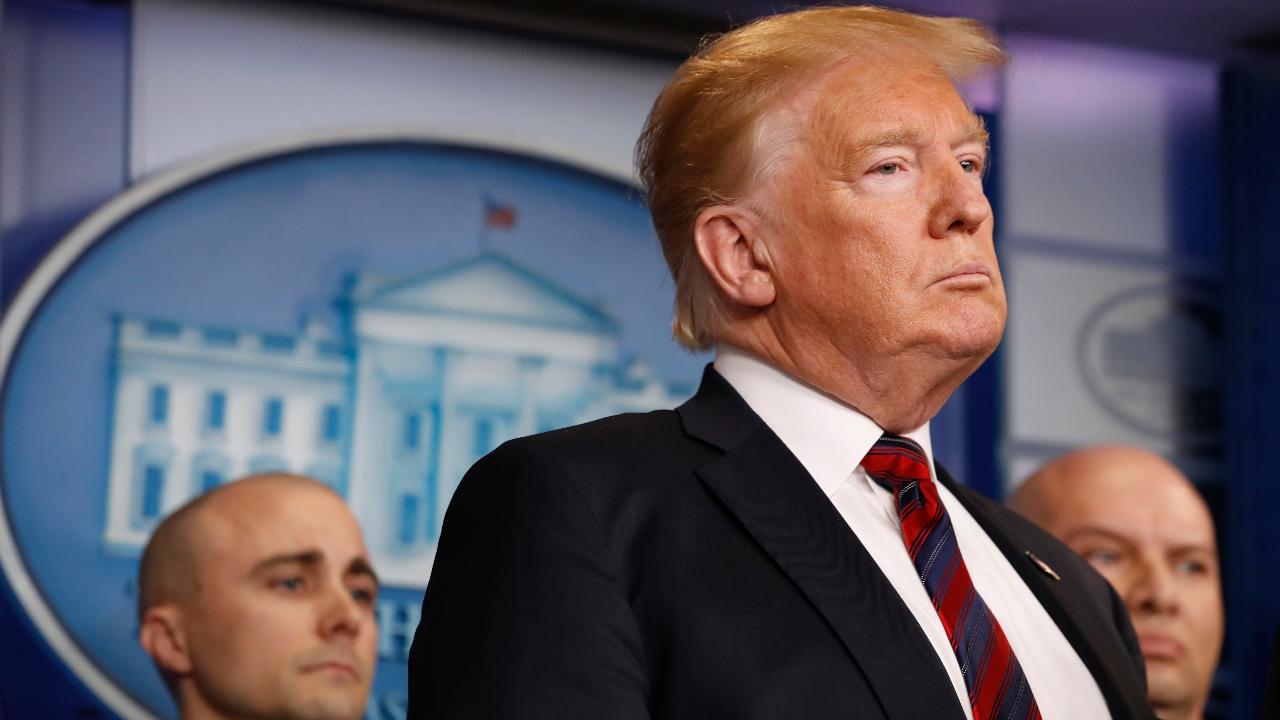Pelosi retakes House gavel despite Democrat defections
What could a Democratic House and Nancy Pelosi as speaker mean for Trump’s agenda? Reaction and analysis from the ‘Special Report’ all-star panel.
Overcoming a defiant last-minute challenge from the party’s progressive wing, House Democrats on Thursday approved most of a sweeping new rules package that effectively places restrictions on some new spending, incorporates ethics reforms and dramatically shakes up several key voting procedures and committees.
Although planned portions of the rules relating to the House’s handling of ObamaCare were tabled for the future, the 234-197 vote marked a decisive defeat of New York Democratic Rep. Alexandria Ocasio-Cortez’s opposition to the measure.
Three Republicans supported the Democrats’ rules, including Pennsylvania Rep. Brian Fitzpatrick, and New York Reps. John Katko and Tom Reed. In addition to Ocasio-Cortez, Hawaii Democratic Rep. Tulsi Gabbard and California Rep. Ro Khanna voted against the rules package.
On Wednesday, Ocasio-Cortez vowed to join Khanna to oppose the so-called “pay-go” rule included in the rules package, supported by House Speaker Nancy Pelosi. That rule requires that any new mandatory spending for entitlements or tax cuts be offset by other separate revenue increases (such as tax hikes) or budget-cutting measures so that the new spending does not expand the federal deficit.
The pay-go principle, Ocasio-Cortez charged in a tweet Wednesday, was a “dark political maneuver designed to hamstring progress on healthcare” and other legislation.
“We shouldn’t hinder ourselves from the start,” she added. But, Pelosi deputy chief of staff Drew Hammill fired back, tweeting: “A vote AGAINST the Democratic Rules package is a vote to let [Director of the Office of Management and Budget (OMB)] Mick Mulvaney make across the board cuts, unilaterally reversing Democratic initiatives and funding increases.”
Pay-go applies to discretionary spending that is approved through the normal appropriations procedure. Last in effect in 2010, pay-go replaces the current so-called “cut-go” provisions, which require only that mandatory spending increases be matched with other cuts to mandatory spending.
CLICK HERE TO GET THE FOX NEWS APP
Other rule changes eliminate the supermajority requirement to pass federal income tax changes, and potentially avoid future showdowns over raising the debt ceiling by suspending the debt limit “through September 30 of the budget year” once the House adopts a budget. The so-called Gephardt rule had offered the House much less latitude, requiring an agreement between the House and Senate on a budget resolution in order to avoid a debt-ceiling vote.
The rules package also establishes a climate-change committee. The Select Committee on the Climate Crisis lacks some of the same legislative teeth that its predecessor committee wielded when Democrats last controlled the House. But, the House rules give the panel until March 31, 2020 to make recommendations to other committees for actual policy changes and legislation.
And, although hats have been barred in the House chamber for more than a century, a new House rule states that “this prohibition does not include religious headwear.” That means the rules will still preclude Democratic Florida Rep. Frederica Wilson from wearing her signature cowboy hats on the House floor — but Democratic Minnesota Rep. Ilhan Omar, a Muslim, will be permitted to wear a hijab.
Additional elements to the rules package include ethics reforms that preclude congressional members and their staff from serving on corporate boards, as well as the revival of a rule that all legislation must be made available at least 72 hours before a vote is held.
Portions of the rules had also provided that the House has the authority to defend ObamaCare, which was recently ruled unconstitutional by a federal judge, in court.
DEM INTRODUCING IMPEACHMENT ARTICLES AGAINST TRUMP ON FIRST DAY OF NEW CONGRESS
Meanwhile, House Democrats Thursday night debated a combined spending bill to end part of the government shutdown.
The House late Thursday ultimately passed a bill to fund the Department of Homeland Security until Feb.8, by a 239 to 192 vote. But the bill does not include any new wall money, and Senate Republicans and the White House have both described it as a non-starter that will never become law. Five Republicans voted for the bill.
Another piece of legislation proposed and debated by Democrats would fund six of the seven unresolved spending bills through Sept. 30. That bill, which the White House has also said will not become law, was approved by a 241-190 vote at approximately 10 p.m. ET, with seven Republicans joining Democrats to vote yea. The measure puts together six of the seven unresolved appropriations bills in one package.
In a news conference Thursday night, Pelosi broadly discussed the ongoing partial shutdown, which has dragged on since Dec. 22 amid demands from the White House that any federal spending bill include funding for a wall on the southern border.
However, Pelosi, even as she said she would be willing to fund border security, called a border wall a symptom of an “old way of thinking” and promised not to fund it.

House Democratic Leader Nancy Pelosi of California, who is expected to lead the 116th Congress as speaker of the House, is applauded at the Capitol in Washington, Thursday, Jan. 3, 2019. (AP Photo/Carolyn Kaster)
“We sense the urgency of opening up the people’s government so that they can be served by the agencies of government on which they rely,” House Majority Leader Steny Hoyer, D-Md., told reporters. “The president has asked us to come down and meet tomorrow at 10:30. And we will do that. And we will have a discussion.” Pelosi then interjected to remind Hoyer that the meeting was actually planned for 11:30 p.m. ET, and joked that Trump perhaps had told her the wrong time intentionally so that she would be absent.
Trump met with Pelosi and other senior Democrats at a contentious meeting on Wednesday in the White House Situation Room, which included Senate Minority Leader Chuck Schumer, D-N.Y., interrupting Homeland Security Secretary Kirstjen Nielsen “within five seconds,” according to Republicans at the meeting. The sitdown adjourned after a consensus emerged that more progress could be made after the new Congress was seated Thursday.
“The message is very simple: This is the first time in history that a government has been shut down while our new electeds have assumed responsibility,” New York Democratic Rep. Nita Lowey, who chairs the House Appropriations Committee, said afterward.
WATCH: TRUMP HOLDS SURPRISE PRESS CONFERENCE WITH BORDER PATROL UNION
Shortly after Pelosi’s historic return to the House speakership, Trump made his first-ever appearance in the White House briefing room to congratulate Pelosi and reaffirm his commitment to the border wall.
Together with officials from the National Border Patrol Council, the union representing border patrol agents and staff, Trump insisted that “we need protection in our country.”
“I promise you, if you interview Border Patrol agents, they will tell you that walls work,” Brandon Judd, the president of the Border Patrol union, told the media after Trump’s introductory remarks. “I worked in Naco, Ariz., for ten years. We didn’t have physical barriers in Naco and illegal immigration and drug smuggling was absolutely out of control. We built those walls, those physical barriers, and illegal immigration dropped exponentially. Anywhere that you look, where we have built walls, they have worked … We need those physical barriers and we appreciate President Trump and all of his efforts in getting us those physical barriers.”
Trump himself likely will soon deliver that message in person to congressional Democrats. In a show of normalcy towards the end of a whirlwind day of history and drama on Capitol Hill, Pelosi on Thursday evening formally invited Trump to deliver State of the Union speech in Congress on Jan. 29.
Fox News’ Chad Pergram and Samuel Chamberlain contributed to this report.





